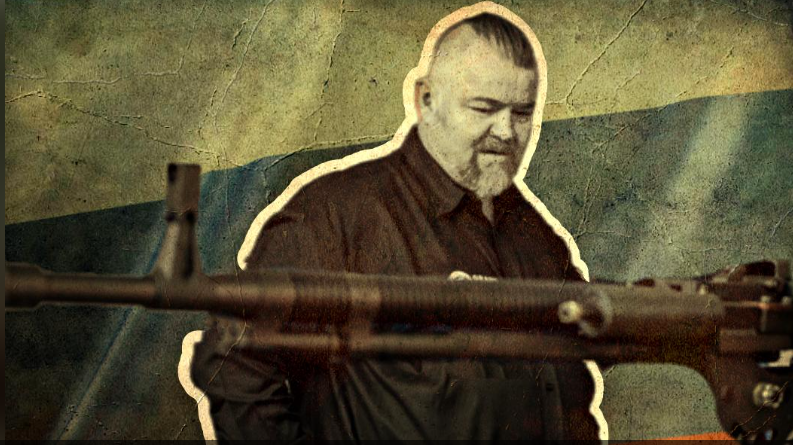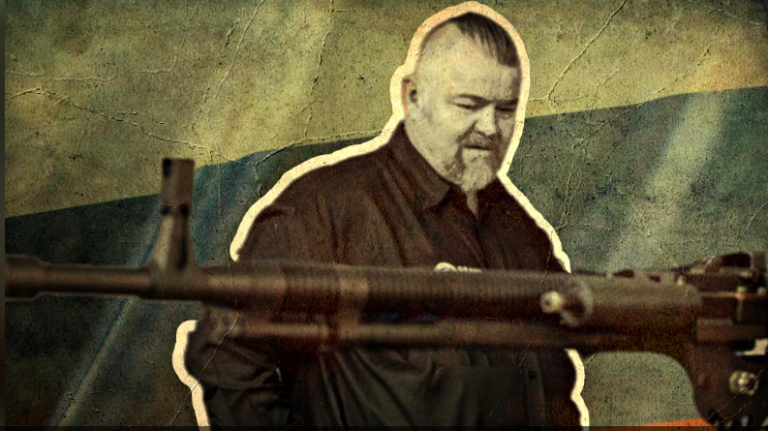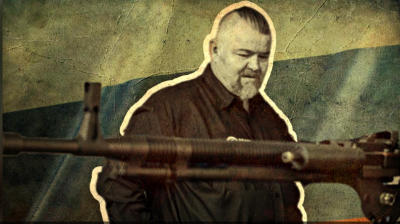Illustration: ICJK (FB/Grand Power, FreePik) 2025-11-27
Illustration: ICJK (FB/Grand Power, FreePik) 2025-11-27
Slovak-made Grand Power weapons are still available in Russian stores despite sanctions because they are manufactured by a factory in Nizhny Novgorod, about 420 km east of Moscow. The Investigative Center of Ján Kuciak (ICJK), together with independent Russian outlet The Insider, discovered that the Slovak arms company granted this factory a license before the full-scale war in Ukraine began in 2022, which was allowed under the legislation at the time. However, we also found that some Slovak weapons reached Russia in violation of sanctions. Grand Power claims it has nothing to do with such deals.
In Russia—despite strict EU sanctions—civilian models of Grand Power weapons designed by Slovak entrepreneur Jaroslav Kuracina are still being produced. Until 2021, his company owned a 50% stake in the Russian manufacturer Fortuna.
According to findings by the Investigative Center of Ján Kuciak and The Insider, Grand Power may have taken advantage of legal loopholes in EU sanctions. Since 2014, those sanctions have banned the export of goods, investments, and technical information to the Russian arms industry, but contracts signed before August 2014 were exempt.
Several transfers of licenses allowing the manufacturing and use of the Grand Power brand occurred after that cut-off date. For example, in October 2023, Fortuna registered serial production of the Q100 civilian pistol model, which Grand Power originally introduced in 2015. However, Grand Power may not have violated the sanctions in force at the time if the licensing agreement was signed before June 2023—the month when the EU added a ban on exporting intellectual property and trade secrets, according to sanctions lawyer Alex Prezanti.
Between 2018 and 2021, Fortuna paid Grand Power 1.6 million euros for licenses and services, according to the Russian company’s annual reports. Yet Kuracina publicly claimed that Grand Power had been forced to leave the Russian market after 2014 due to sanctions.
“Our main market back then was the Russian Federation, where we supplied nearly half a million euros’ worth of goods every month. After sanctions and the weapons embargo were imposed in 2014, we had to stop supplying Russia and almost went bankrupt,” he told SME in November.
In 2018, Russia still accounted for roughly a quarter of Grand Power’s total revenue. By 2022, sales there had disappeared entirely, replaced by income from so-called “third countries.”
Grand Power insists it follows all sanctions rules. However, we discovered that dozens of its weapons still reached Russia even after the invasion of Ukraine. For example, in September 2023, the Military-Sports Center for Training and Patriotic Education of Hero Nikita Gusev in Stavropol purchased two Grand Power pistols. These were most likely re-exports from third countries where the Slovak company had legally shipped them.
Kuracina’s Grand Power also supplies weapons to Ukraine. It manufactures civilian F4 rifles for Ukrainian firm FLARM—models that Ukrainian armed forces began using after the Russian invasion.
Recently, the Investigative Center of Ján Kuciak highlighted a possible conflict of interest involving a major 100-million-euro Slovak army rearmament deal. The defense minister Robert Kaliňák’s company, Liwa Arms, has its base at premises owned by people with ties to Grand Power—the only manufacturer the ministry is currently negotiating with.
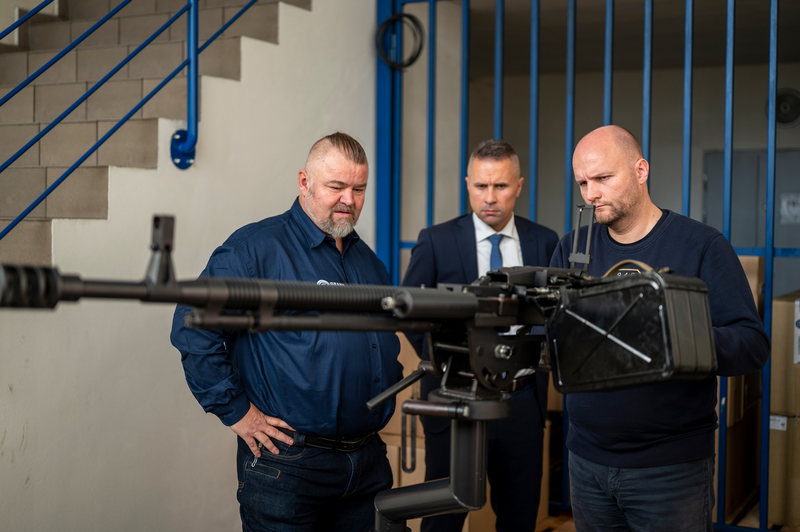
Jaroslav Kuracina (left) in 2022 during the visit of the then-Minister of defense Jaroslav Naď. Source: Grand Power
Business in Russia
Russian online weapons forums confirm that Kuracina exported his first products to Russia as early as 2007.
The first non-lethal T10 pistols were sold by the Russian company AKBS—Production and Trading Enterprise Agency for Commercial Security. They were marketed as “jointly developed” with Grand Power, according to AKBS’s website from 2007. Production of newer models was soon moved directly to Nizhny Novgorod, with Grand Power supplying only components. AKBS was run at the time by former KGB colonel Yuri Sankin and his daughter Anastasia Guda, the majority shareholder.

Translation of a post about the delivery of Grand Power T10 from 2007. Source: forum.guns.ru
AKBS ran into financial trouble when the Federal Security Service (FSB) began investigating it. Sankin and the firm’s management were accused of smuggling and illegally selling weapons, including Slovak-made Grand Power components. The FSB questioned Kuracina in 2013 while he was on a business trip in Russia.
Sankin initially denied the allegations but eventually agreed to a plea deal in February 2015. He received a suspended sentence of five and a half years for stealing more than 120,000 firearms obtained for free from the Russian Ministry of Defense, and for smuggling and illegal weapons trading.
Grand Power’s non-lethal “traumatic” weapons are popular among civilians for self-defense. They fire rubber projectiles that can injure but are not meant to be deadly. Some state security forces also use such weapons for crowd control.
Before AKBS went bankrupt, several employees and investors created the company Fortuna, which Grand Power joined as a 50% shareholder in 2013. Initially, Fortuna imported and assembled weapons from Slovak components, but after 2013 it began producing complete weapons—along with rubber ammunition—under the Grand Power brand.
Sanctions
The EU Council imposed sanctions on Russia in spring 2014 after the annexation of Crimea. In addition to banning the export of weapons and components, EU Council Regulations 833/14 and 2014/512/CFSP were meant to prevent European arms manufacturers from shifting production to Russia through licenses or investments in Russian factories. Only contracts signed before August 1 2014 were exempt, until the EU tightened sanctions again in 2022.
Grand Power sold its stake in Fortuna in April 2021, but the Russian company continued producing weapons under the Slovak brand. According to The Insider, Fortuna obtained six certificates between 2022 and 2024 for producing non-lethal and civilian Grand Power weapons.

Certificate of conformity for Grand Power K100 – Fortuna, October 11, 2023
A 2020 lawsuit filed jointly by Fortuna and Grand Power against private owners of the domain grandpower[.]ru also shows the Slovak company’s effort to keep its presence in Russia. They won the case, and the court confirmed Grand Power’s exclusive trademark rights—rights the Slovak company had contractually transferred to Fortuna in 2016 and again in 2019.
Both transfers occurred after the 2014 sanctions, but the rules still allowed legal license transfers until June 2023.
In another court decision in 2021, Russian courts granted Fortuna and Grand Power exclusive rights to produce under the Grand Power brand on Russian territory.
The Degtyarev Arms Factory produced more than 2,000 Grand Power T11 and T12 weapons without permission from Fortuna or Grand Power. It had to pay Fortuna 7.98 million rubles (around 91,600 euros at the 2021 average exchange rate) and sell the remaining stock to Fortuna or Grand Power.
Grand Power spokesperson Lukáš Kuna said: “The enforceability of any rights in the Russian Federation is absolutely zero. The company FORTUNA does not communicate with us in any way. We have taken several unilateral steps, but none have led anywhere.”
He did not specify what steps the company took.
Kuna also said Grand Power allowed the use of its trade name only to a limited extent and under strictly defined conditions, limited exclusively to non-lethal weapons for civilian end users.
In October 2023, Fortuna received a certificate to start serial production of the Q100 9×19 pistol model, introduced by Grand Power in 2015.
According to sanctions lawyer Alex Prezanti, this did not necessarily violate sanctions if the trademark and know-how were transferred before June 2023:
“The prohibition on transferring and licensing intellectual property rights related to firearms was added to EU Council regulations only in June 2023.”
Grand Power denies any wrongdoing: “Our company has always respected all trade measures. All exports from Slovakia are strictly controlled by the competent authorities. If there is even the slightest doubt about the end-user, export licenses are denied without explanation, costing us hundreds of thousands of euros annually.”
The Slovak Ministry of Economy, responsible for arms export licensing, did not respond to questions before the deadline.
Illegal Imports
Despite strict sanctions on importing weapons, several Grand Power weapons appeared on the Russian market after 2022, supplied by at least two Russian importers. EU member states prohibit exporting weapons to Russia via third countries.
The Russian importer Varyag (“Viking”) brought in 12 Stribog SR9A3 and RSR9A3 rifles mislabeled as “hunting carbines,” and another company imported 96 Grand Power K100 Dynamic pistols. According to customs certificates, the weapons originated in Slovakia, but the listed production address for the Stribog rifles matched that of Barrett Firearms Manufacturing in the United States.
Since the start of the war, Varyag has imported more than 501 weapons and 140,000 rounds of ammunition into Russia. The Insider’s journalists found that Varyag specializes in importing British, Canadian, and American sniper rifles used by Russian snipers in Ukraine.
The Investigative Center of Ján Kuciak gave Grand Power the serial numbers of weapons that appeared in Russia after the invasion. Grand Power denied wrongdoing: “None of the weapons were exported by us to the Russian Federation. The weapons in question were exported to an EU country based on a valid license issued by the Ministry of Economy.”
Grand Power did not reveal the name or the country of the buyer. It is unclear how the weapons later reached Russia.
Export databases show that Grand Power exported at least 150 pistols to Moldova in 2023. The importer, S.A. “CARTUS,” matches the Moldovan state arms producer Cartuș, which became the subject of Moldovan and EU investigations after a 2021 smuggling scheme. Cartuș director Vasile Gondiu was accused of smuggling Czech, Slovak, and Hungarian weapons and ammunition into Russia and Belarus.
Investigators said Gondiu did not obtain the required export licenses, instead declaring the weapons to be sporting or hunting equipment.
Grand Power said these were “samples intended for the local civilian market,” but declined to specify the recipient company.
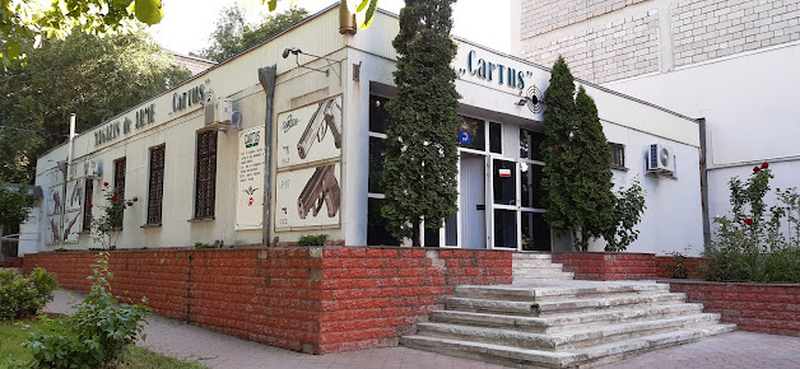
Cartus, a Moldovan gun shop. Source: Google Maps
Weapons Used for Patriotic Training in Russia
In September 2023, the Military-Sports Center for Training and Patriotic Education of Hero Nikita Gusev in Stavropol bought several new firearms from the company Gefest: 10 from Austria, two from Slovakia, and nine from Czechia.
At that point, all exports from EU manufacturers were prohibited, so the weapons must have entered Russia illegally. Online materials show that the center focuses on propaganda and military-style training. Photos show school-aged children in uniform learning to handle weapons, operate drones, or perform first aid.
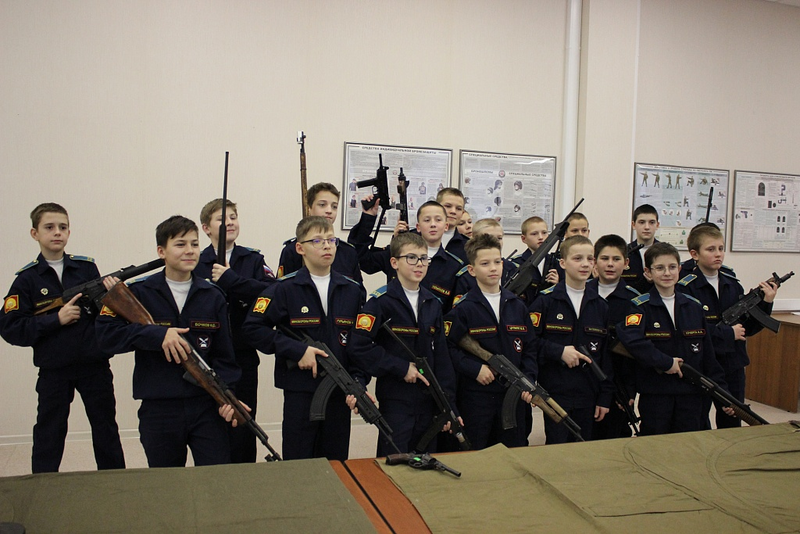
Source: Telegram channel of hero Nikita Gusev in Stavropol
The center is named after Russian soldier Nikita Gusev, who was killed in Ukraine by artillery in September 2022. President Vladimir Putin posthumously awarded him the title Hero of the Russian Federation. The center frequently expresses gratitude to those who “risked their lives to defend their homeland,” and the Stavropol facility was named in his honor.
This investigation was originally published in Slovak on ICJK.sk.
Subscribe to Goulash, our original VSquare newsletter that delivers the best investigative journalism from Central Europe straight to your inbox!

